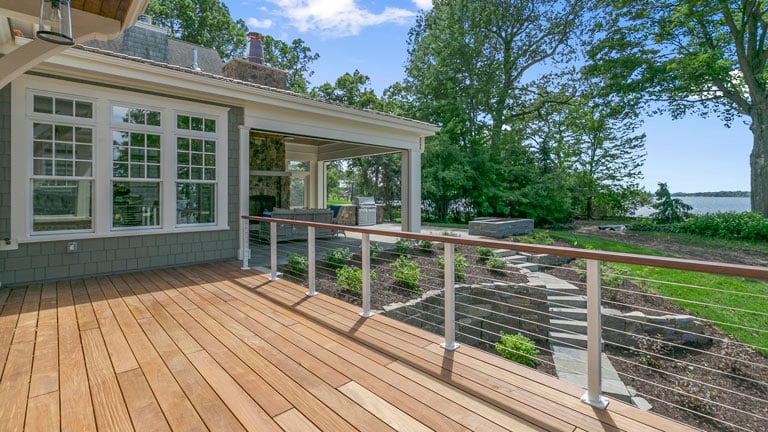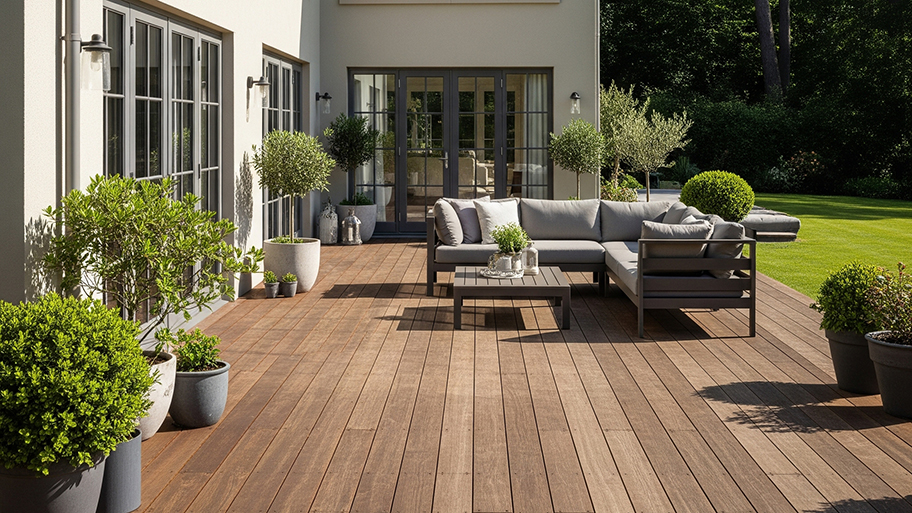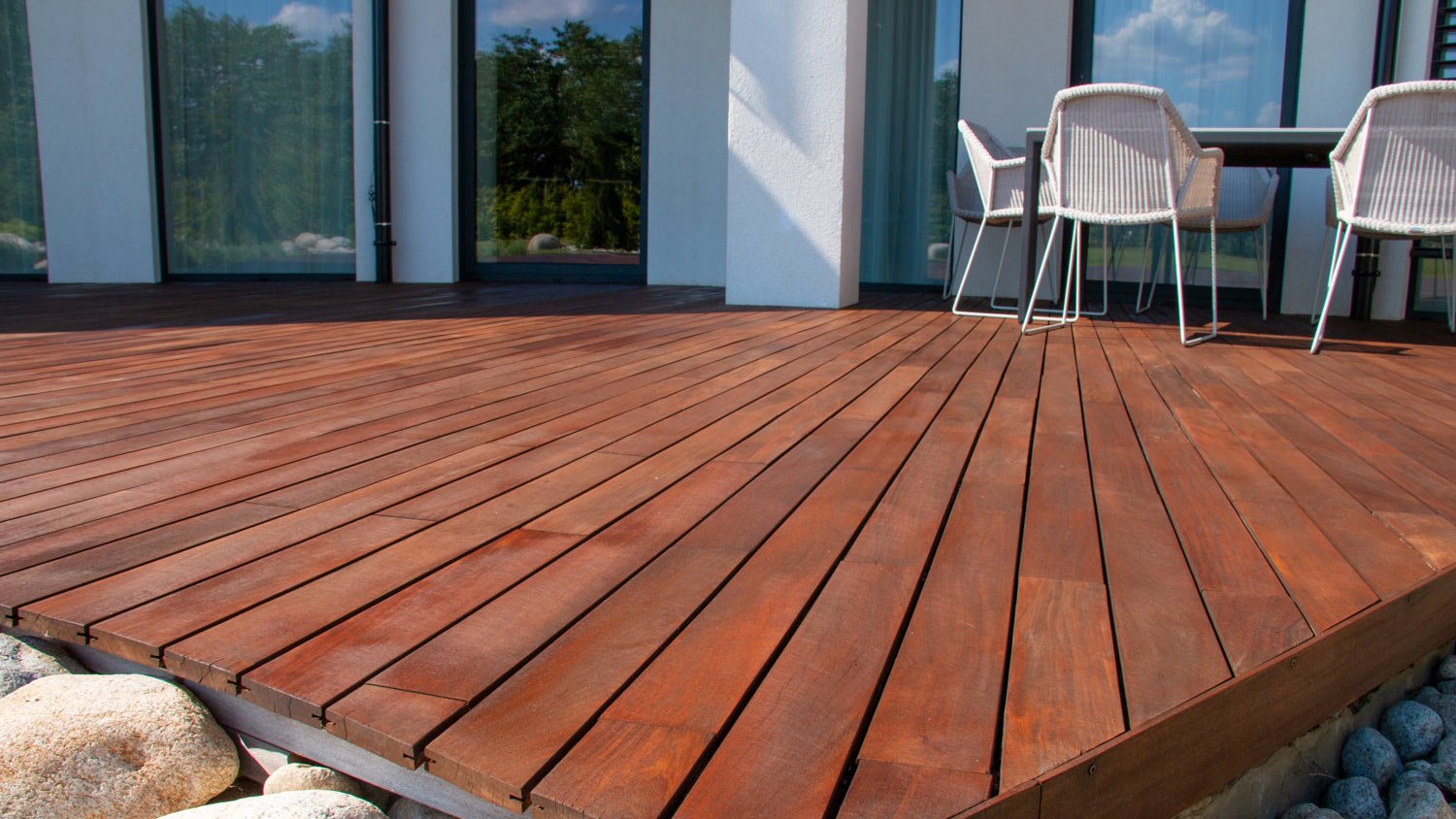
Sealing a deck is important for protecting it against the elements. Find out the cost to seal a deck, whether you DIY or hire a pro to do the job.
Wooden decks can deteriorate quickly without proper care and regular maintenance. Cleaning, staining, and sealing a deck after pressure washing will add years to its life span.


Decks make great outdoor features, but you need to perform regular deck maintenance if you want to keep them looking fresh and clean. These backyard structures are exposed to a lot—like foot traffic and constant exposure to the elements—so maintenance tasks like staining and sealing, power washing, and cleaning make a big difference in your deck’s lifespan and prevent common deck problems. Follow these steps to learn how to maintain your deck.
Regular deck maintenance includes sweeping off debris, washing the deck with mild soap, and hosing it down or pressure washing it. Long-term maintenance includes repairing or replacing hardware or boards and always being on the lookout for damage, warping, or cracking/peeling paint.
Annual deck maintenance ensures your deck lasts as long as possible, looks beautiful, and is protected from the elements. Without proper cleaning and maintenance, your deck boards can fade and deteriorate. Your deck can also become susceptible to rot, mildew, and termites. A well-maintained deck allows you to preserve the value of your deck and enjoy your outdoor space for dining, entertaining, and relaxing.
Deck protection depends on continually maintaining the surface. Sealing a wood deck with stain or sealer is critical because it protects the wood from rain and dew, which can cause the wood to swell. Sealing also protects your deck from the sun, which can shrink and dry the wood. Ongoing weather wear and tear can cause wood to warp, cup, crack, and gray. Follow these wood deck maintenance guidelines.
With a screwdriver or putty knife, clear out debris, leaves, and dirt from the gaps between your deck boards once a year. Removing build-up allows for better water drainage and makes space for debris to fall through the cracks.
Sweep the entire deck of dirt, debris, leaves, and salt at least once per year. Move your furniture, grill, and other accessories out of the way. A thorough sweep ensures your deck remains clean and dry.
On a low setting, power wash your deck with a sprayer or wide fin, or clean it with a long-handled scrub brush. If cleaning with a brush, pre-rinse the deck to allow the cleaner to disperse better.
Then, apply a gentle deck cleaner or use a homemade deck cleaning solution. Mix 2 gallons of warm water with 2 cups of oxygen bleach in a bucket. Add ¼ cup of ammonia-free liquid dish soap and stir again. If you have mold or mildew spots, add 1 cup of borax to your cleaning solution and scrub the area. Rinse your deck completely to remove all the cleaning solution.
Inspect the deck at least once a year. Check for split wood, loose deck boards, rot, wobbly spots, and weak handrails. Repair, replace, and fortify parts that are in disrepair, including screws or nails.
Every two to three years, restain or reseal your deck. You'll need to clean and sand your deck first, then apply a coat of stain or sealant. If you have a painted deck, you'll need to repaint about every 10 years.
Consider hiring a professional deck refinisher to tackle the job for you. Staining or painting a deck by a pro is the best way to add years to its life. If you’re trying to decide between painting or staining wood, talk to an expert about the pros and cons.

Taking care of your composite deck ensures that it remains beautiful and durable for years. While you won't need to stain, seal, or paint a composite deck, you need to clean it annually and repair loose or damaged parts.
With a putty knife or screwdriver, clear out debris, grass, leaves, and dirt from the gaps between your deck boards. Clearing the gaps prevents wood decay, mildew growth, and also leads to a nicer looking finish.
Sweep your deck at least once a year to remove debris, leaves, dirt, and salt from the winter. Ensure a thorough cleaning by removing deck furniture and other obstacles before starting.
Clean your deck with a power washer on a low setting, or use a long-handled scrub brush to clean the surface. Apply a gentle deck cleaner or a homemade deck cleaning solution made of 2 gallons of warm water and 1/4 cup of dish soap.
Rinse the deck thoroughly to ensure no debris or dirty water dries on the deck. If not, it can cause water or soap spots to appear on your composite deck surface.
Inspect the deck annually for loose or damaged deck boards, wobbly spots, and weak handrails. You may need a composite deck repair kit or replace deck boards altogether.
Aluminum is heat-resistant and rust-resistant, making it a popular choice for decks. Its low maintenance requirements also make it an attractive choice. Learn how to clean an aluminum deck with the steps below.
Remove all furniture and decor.
Dry sweep the deck to get rid of debris like leaves and dirt.
Create a mixture of water and a gentle soap.
Dip a microfiber cloth or natural-bristle brush into the soapy mixture and gently scrub your deck.
Thoroughly rinse off the soap residue with a garden hose or a big bucket of clean water.
Let the deck dry before walking on it or replacing furniture and decor.
Keep in mind that you should not pressure wash an aluminum deck or use steel wool or scrapers to clean your deck because these cleaning methods will permanently damage your pristine aluminum.
Protect your deck on a regular basis with these tips.
Inspect your deck at least once a year. Look for split or decaying wood, corroded or missing fasteners, excessive wobbling, and wonky railings.
Always use a grease catcher with a grill. Grease stains are some of the most difficult to remove from deck boards.
Keep it clean by regularly sweeping your deck for leaves and dirt or shoveling snow from it. The build-up from dirt or leaves can damage it in the long term.
Replace damaged deck boards when necessary, along with loose nails, screws, or fasteners.
Rearrange furniture and grill on occasion to avoid fading in certain areas.
Trim nearby plants and trees to be at least one foot from your deck to avoid moisture or sap damage.
Clean up grease, food, and drink spills as soon as possible to avoid permanent staining.
Redirect downspouts away from the deck posts to avoid moisture damage and rot.
Keep mulch at least three inches away from the decking to avoid rot.
Use outdoor woven rugs instead of rubber mats because they don’t trap moisture.
If you have a backyard fire pit, use a spark screen to keep embers from flying onto your deck on windy days. Always put out a fire before leaving it.
Apply a deck brightener every few years to revitalize the surface and remove tannins.
Avoid using harsh cleaners and using a pressure washer on anything but a low setting, as these can damage your wood.
You can handle annual deck maintenance yourself with a free weekend and a few simple tools. However, refinishing a deck involves more time and some specialty tools, such as an orbital sander. You can hire a local deck cleaner to cross deck maintenance off your to-do list. Cleaning costs anywhere from $30 to $60 an hour, depending on where you live and the condition of your deck. Deck refinishing costs anywhere from $600 to $1,360 on average.
Paul Pogue contributed to this piece.
From average costs to expert advice, get all the answers you need to get your job done.

Sealing a deck is important for protecting it against the elements. Find out the cost to seal a deck, whether you DIY or hire a pro to do the job.

Left with a sticky mess instead of a beautifully stained wood project? Learn why your wood stain isn’t drying and how to fix the problem.

Finding maintenance-free decking that works for your home, budget, and lifestyle can be challenging. This guide lists the 7 best low-maintenance deck materials.

If you’re stuck wondering why your deck stain is peeling prematurely, use this guide to troubleshoot the problem and find a long-lasting solution.

You can get even more years out of your cedar fence by giving it a little stain and TLC. Learn how to seal a cedar fence with this guide.

Cleaning your deck at least once a year boosts its durability and appearance. Learn how to clean decking, whether it's wood or composite.